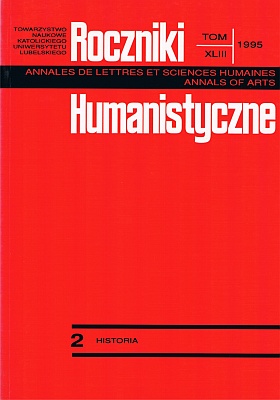Izydor Kajetan Wysłouch Towards the Peasant Movement and Liberal Intelligentsia in the Kingdom of Poland
Abstract
Izydor Kajetan Wysłouch (1869-1937) was one of the most controversial figures in the Kingdom of Poland in the beginning of the twentieth century. He was a graduate of Warsaw University, co-founder of the Order of Friars Dolorists, an order without habit, capuchin, and collaborator of bl. Honorat Koźmiński. In the period of 1905-1910 he was a prolific publicist who demanded thorough reforms inside the Church and fought for socio-political reforms. After Pius X had issued his antimodernist encyclical (1907) Wysłouch left the monastery, and then the Catholic Church.
The paper shows Wysłouch's participation in the first organizational initiatives concerning the establishment of the peasant movement in the Kingdom of Poland, and the relations with liberal intelligentsia which initiated this movement.
Wysłouch was not prominent in the activity of the first peasant part, the Polish Peasant Union (1904-1907). He had contacts with its founders (as a collaborator of the party organ „Życie Gromadzkie” [Community Life]) and conveyed many ideas into the second peasant party which was established, among others, of his own accord, i.e. to the Union of Young People's Poland (from 1906). He belonged to permanent collaborators of the party's organ „Siewba” [Sowing] (1906-1908), he was the author of the party's programme and participated in the S. Staszic Society of the Associations of Farmers. He defended the „sowers” against the attacks the conservative and church officials. Many Catholics thought that the peasant movement was inspired by the liberal intelligentsia which was hostile to the Church.
The literature which deals with this problem has up to now shown the problem of the genesis and beginnings of the peasant movement in the context of its conflicts with the institutional Church and resentment on the part of the Catholics who adopted a conservative attitude.
The movement, indeed, bore a political character, yet for the Church the conflict bore first of all the character of people's outlook on life. The liberal intelligentsia by stimulating the village to political awareness, caring about its education, surely became an ally of peasants' interest. This was, however, done on political grounds, as well, i.e. to broaden the scope of its political party's influence, commonly called Progressive Democracy. Many activists from this party ware not only anticlerical but were also willing to fight with the Church and religion. That is why taking power over the institutions which were called up to economically and politically educate peasants (the paper „Zaranie” [Dawn], taking full control of the Society of the Associations of Farmers) encountered counteraction on the part of the Church. That Wysłouch remained in the Church's structures and at the same time collaborated with the liberal intelligentsia was a big problem for the Catholics in the Kingdom of Poland in the years 1905-1910. They accused him of acting as figure-head in the works of the enemy's camp. The Catholic press revealed the ideology and outlook on life of the protectors of the peasant movement and warned against accepting them. On the basis of the journalism of the liberal camp the author sought to show that the Church's fears were well-grounded, the proof of which the evolution of Wysłouch's standpoint.
This antichurch attitude of the liberal intelligentsia was spurned before the World War One due to political reasons. They feared that the whole society would join the National Democratic Party which competed with the liberal intelligentsia. The fact that they ceased fighting meant also acknowledging the policy which they had formerly carried out. In this new political context Wysłouch's services were no longer necessary for the liberal camp. That is why he never again publicly pronounced his opinions on socio-political affairs.
Copyright (c) 1995 Roczniki Humanistyczne

This work is licensed under a Creative Commons Attribution-NonCommercial-NoDerivatives 4.0 International License.





